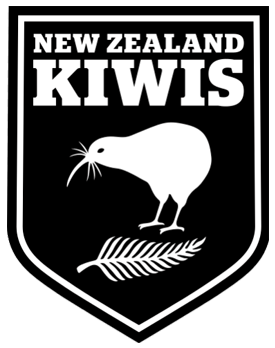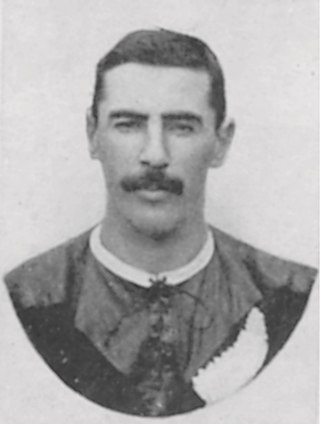
The New Zealand national rugby union team, commonly known as the All Blacks, represents New Zealand in men's international rugby union, which is considered the country's national sport. Famed for their international success, the All Blacks have often been regarded as one of the most successful sports teams in history.

The New Zealand national rugby league team has represented New Zealand in rugby league since 1907. Administered by the New Zealand Rugby League, they are commonly known as the Kiwis, after the native bird of that name. The team's colours are black and white, with the dominant colour being black, and the players perform a haka before every match they play as a challenge to their opponents. The New Zealand Kiwis are currently second in the IRL World Rankings. Since the 1980s, most New Zealand representatives have been based overseas, in the professional National Rugby League and Super League competitions. Before that, players were selected entirely from clubs in domestic New Zealand leagues.

George Arthur Gillett was a New Zealand multi-code footballer of the early 20th century and a dual-code rugby international. Gillett died in 1956 in Onehunga.

Arthur Stephen "Ash" Hennessy was an Australian pioneer rugby league identity. He was a seminal figure in the creation of the South Sydney Rabbitohs for whom he played and later coached. He was a state and national representative hooker/forward and was the first captain of the Australian national rugby league team. He played for New South Wales in the first rugby match run by the newly created 'New South Wales Rugby Football League' which had just split away from the established New South Wales Rugby Football Union. He later coached at club, state and national representative levels.
The following lists events that happened during 1884 in New Zealand.
The 1953–54 New Zealand rugby union tour of Britain, Ireland, France and North America was a rugby union tour undertaken by the New Zealand national team which toured Europe and North America. The team was captained by Bob Stuart.

Charles Dunning was a New Zealand rugby footballer who was part of the professional 1907–1908 New Zealand rugby tour of Great Britain.
The 1908 New Zealand rugby league season was the first season that rugby league had been played in New Zealand. Auckland played Wellington in a two match series that was won by Auckland 1-0. Otago and Southland also participated in a two match series which was drawn 1-all. Auckland and Taranaki then drew a two match series.

John Arthur Fihelly was a public servant, politician and rugby union player in Queensland, Australia. He was the Treasurer of Queensland. He represented Australia as a professional rugby league footballer and a founder of the Queensland Rugby League.

The 1910 Great Britain Lions tour of Australia and New Zealand was the first international tour of the Great Britain national rugby league team, "The Lions". They played the second ever Ashes series against Australia, and their first as the visiting team, before travelling to Auckland to take on New Zealand. The tour was a huge promotional and financial success for what was then known as the "Northern Union" game and helped set the pattern for regular, alternating test match series between Britain and Australia. It is regarded as one of the most important events in the history of rugby league.
The 1910 New Zealand rugby league season was the third season of rugby league that had been played in New Zealand.
The 1911 New Zealand rugby league season was the fourth season of rugby league that had been played in New Zealand.
The 1912 New Zealand rugby league season was the fifth season of rugby league that had been played in New Zealand.
The 1914 New Zealand rugby league season was the seventh season of rugby league that had been played in New Zealand.
The 1926 New Zealand rugby league season was the 19th season of rugby league that had been played in New Zealand.
The 1938 New Zealand rugby league season was the 31st season of rugby league that had been played in New Zealand.
The 1947 New Zealand rugby league season was the 40th season of rugby league that had been played in New Zealand.
The 1914 Great Britain Lions tour of Australia and New Zealand was the second ever British national rugby league team or 'Lions' tour of Australasia, where it was winter and matches were played against the Australian and New Zealand national sides, as well as several local teams. The tour repeated the promotional and financial success of the 1910 Great Britain Lions tour of Australasia and became famous for the third and deciding Ashes test, known as the "Rorke's Drift Test" due to a backs-to-the wall British victory against all odds.







